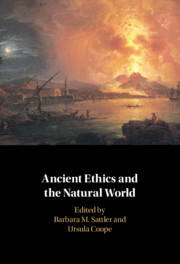Book contents
- Ancient Ethics and the Natural World
- Ancient Ethics and the Natural World
- Copyright page
- Dedication
- Contents
- Contributors
- Note on the Editors
- Introduction
- Part I Humans in Nature: Nature and Law, Humans and Natural Catastrophes
- Chapter 1 Legislating in Accordance with Nature in Plato’s Laws
- Chapter 2 Astronomy and Moral History in Plato’s Timaeus
- Chapter 3 Natural Catastrophe in Greek and Roman Philosophy
- Part II Humans as Godlike, Gods as Humanlike: Presocratics and Platonists
- Part III Emotions, Reason, and the Natural World (Aristotle)
- Part IV Action and the Natural World (Aristotle)
- Part V The Naturalness of Goodness
- Bibliography
- Index Locorum
- General Index
Chapter 2 - Astronomy and Moral History in Plato’s Timaeus
from Part I - Humans in Nature: Nature and Law, Humans and Natural Catastrophes
Published online by Cambridge University Press: 13 August 2021
- Ancient Ethics and the Natural World
- Ancient Ethics and the Natural World
- Copyright page
- Dedication
- Contents
- Contributors
- Note on the Editors
- Introduction
- Part I Humans in Nature: Nature and Law, Humans and Natural Catastrophes
- Chapter 1 Legislating in Accordance with Nature in Plato’s Laws
- Chapter 2 Astronomy and Moral History in Plato’s Timaeus
- Chapter 3 Natural Catastrophe in Greek and Roman Philosophy
- Part II Humans as Godlike, Gods as Humanlike: Presocratics and Platonists
- Part III Emotions, Reason, and the Natural World (Aristotle)
- Part IV Action and the Natural World (Aristotle)
- Part V The Naturalness of Goodness
- Bibliography
- Index Locorum
- General Index
Summary
This chapter addresses the puzzling question of why, in his Timaeus, Plato combines two very different topics: a cosmogony and account of the universe, on the one hand, and a story about the moral actions of ancient Athens, Atlantis, and Egypt, on the other. Sattler argues that the key to understanding the relation between these two parts is recognition that, in Plato’s view, they confront us with a structurally similar problem: how we are to account for the intelligibility of processes in the phenomenal world. Sattler shows that Plato no longer chooses to solve this problem by tying intelligibility to complete uniformity, as he did in the Republic, but by tying intelligibility to a rule – to norms and laws for actions in the human cultural realm, and to ratios and descriptive rules for the motions of the heavenly bodies in the natural realm. While Plato also accounts for the concerns specific to ethics and physics, the attempt to understand processes raises similar problems for him in both realms. Recurring natural catastrophes, such as floods and fires, appear as one kind of natural regularity in this Platonic account.
Keywords
- Type
- Chapter
- Information
- Ancient Ethics and the Natural World , pp. 32 - 49Publisher: Cambridge University PressPrint publication year: 2021



